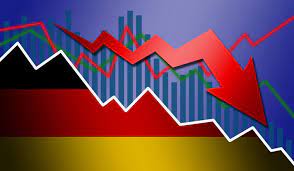
Early in 2023, recession hit the German economy as consumer spending in Europe's economic engine finally buckled under the weight of soaring inflation.
According to a second estimate released by the statistics office on Thursday, the gross domestic product decreased by 0.3% in the first quarter of the year after accounting for price and calendar changes. This comes after a 0.5% fall in the fourth quarter of 2022. Two consecutive quarters of contraction is the conventional definition of a recession.
German GDP figures displayed "surprisingly negative signals," according to Christian Lindner, Germany's finance minister, on Thursday. In comparison to other highly developed economies, he continued, Germany's economy was losing capacity for expansion.
"I don't want Germany to play in a league in which we have to relegate ourselves to the last positions," he said, referring to the forecasts of the International Monetary Fund, which forecast a recession in 2023 only in Germany and Britain among European countries.
"Under the weight of immense inflation, the German consumer has fallen to his knees, dragging the entire economy down with him," Andreas Scheuerle, an analyst at DekaBank, said.
After accounting for pricing, seasonal, and calendar changes, household consumption decreased by 1.2% from one quarter to the next. Government spending also fell sharply by 4.9% on a quarterly basis.
"The warm winter weather, a rebound in industrial activity, helped by the Chinese reopening, and an easing of supply chain frictions, were not enough to get the economy out of the recessionary danger zone," ING's global head of macro Carsten Brzeski said.
In contrast, after a dismal second half of 2022, investment increased in the first three months of this year. When compared to the prior quarter, investment in machinery and equipment climbed by 3.2%, and investment in construction increased by 3.9%.
Trade made helpful contributions as well. While imports decreased 0.9%, exports increased 0.4%.
"The massive rise in energy prices took its toll in the winter half-year," Commerzbank's chief economist Joerg Kraemer said.
Unavoidable as it was, a recession has occurred, and the question now is whether or not there will be a recovery in the second half of the year.
"Looking beyond the first quarter, the optimism at the start of the year seems to have given way to more of a sense of reality," ING's Brzeski said.
Weak economic activity is supported by a decline in purchasing power, dwindling industry order books, aggressive monetary policy tightening, and the anticipated contraction of the U.S. economy.
All significant leading indicators for the manufacturing sector are currently declining as a result of Wednesday's decline in the Ifo business climate, according to Kraemer from Commerzbank.
According to a monthly economic report released on Wednesday, the German Bundesbank forecasts the economy to expand marginally in the second quarter as a recovery in industry more than offsets stagnant home consumption and a decline in construction.
(Source:www.dw.com)
According to a second estimate released by the statistics office on Thursday, the gross domestic product decreased by 0.3% in the first quarter of the year after accounting for price and calendar changes. This comes after a 0.5% fall in the fourth quarter of 2022. Two consecutive quarters of contraction is the conventional definition of a recession.
German GDP figures displayed "surprisingly negative signals," according to Christian Lindner, Germany's finance minister, on Thursday. In comparison to other highly developed economies, he continued, Germany's economy was losing capacity for expansion.
"I don't want Germany to play in a league in which we have to relegate ourselves to the last positions," he said, referring to the forecasts of the International Monetary Fund, which forecast a recession in 2023 only in Germany and Britain among European countries.
"Under the weight of immense inflation, the German consumer has fallen to his knees, dragging the entire economy down with him," Andreas Scheuerle, an analyst at DekaBank, said.
After accounting for pricing, seasonal, and calendar changes, household consumption decreased by 1.2% from one quarter to the next. Government spending also fell sharply by 4.9% on a quarterly basis.
"The warm winter weather, a rebound in industrial activity, helped by the Chinese reopening, and an easing of supply chain frictions, were not enough to get the economy out of the recessionary danger zone," ING's global head of macro Carsten Brzeski said.
In contrast, after a dismal second half of 2022, investment increased in the first three months of this year. When compared to the prior quarter, investment in machinery and equipment climbed by 3.2%, and investment in construction increased by 3.9%.
Trade made helpful contributions as well. While imports decreased 0.9%, exports increased 0.4%.
"The massive rise in energy prices took its toll in the winter half-year," Commerzbank's chief economist Joerg Kraemer said.
Unavoidable as it was, a recession has occurred, and the question now is whether or not there will be a recovery in the second half of the year.
"Looking beyond the first quarter, the optimism at the start of the year seems to have given way to more of a sense of reality," ING's Brzeski said.
Weak economic activity is supported by a decline in purchasing power, dwindling industry order books, aggressive monetary policy tightening, and the anticipated contraction of the U.S. economy.
All significant leading indicators for the manufacturing sector are currently declining as a result of Wednesday's decline in the Ifo business climate, according to Kraemer from Commerzbank.
According to a monthly economic report released on Wednesday, the German Bundesbank forecasts the economy to expand marginally in the second quarter as a recovery in industry more than offsets stagnant home consumption and a decline in construction.
(Source:www.dw.com)





